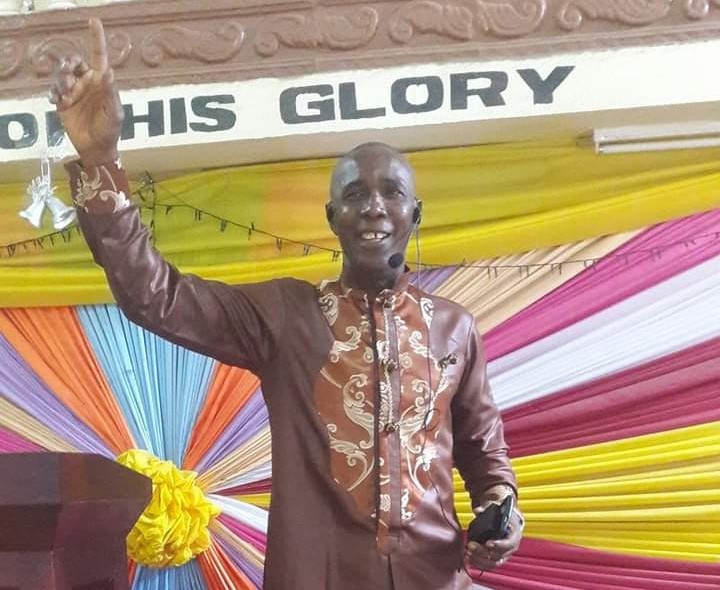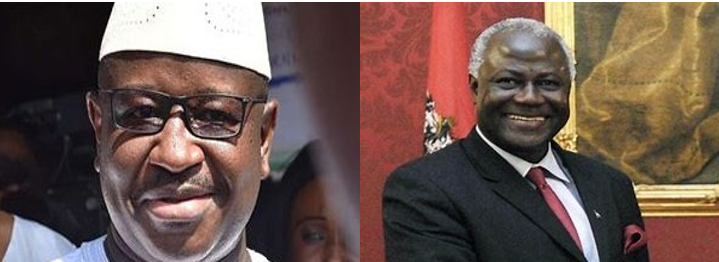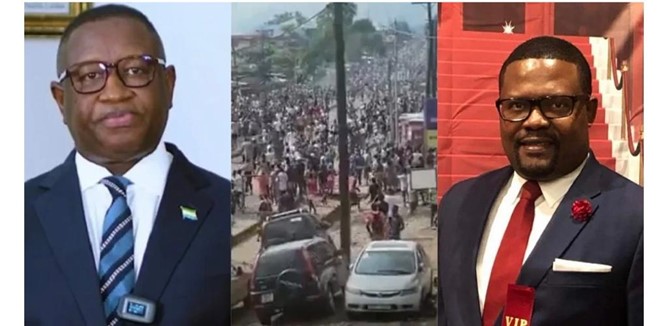The problems with the SLPP!
Since the post-Independence era only two major political parties have existed in Sierra Leone although minor political parties have often existed during general elections especially when the new political dispensation was ushered in in 1996.
The Sierra Leone Peoples Party (SLPP), which is the oldest political party in the country and the sub-region was formed on 27th April, 1951, and the All Peoples Congress (APC), which was formed nine years later, are the two major political parties that have ruled Sierra Leone since Independence on 27th April, 1961.
The APC has ruled for the better part of almost our fifty-five years of Independence and based on its current performance in governance, and the ever-growing problems in the grand-old SLPP, nobody would be surprised if the APC would stay in power for decades to come. If no solutions are sought to the numerous problems in the SLPP, there would be no better alternative to the APC and here is a country where the idea of ‘Third Force’ political party to challenge the status quo would never be appreciated by most citizens because of our political culture that is predicated on ethno-regional support on which the two major political parties thrive.
The fact that Sierra Leone is an emerging democracy and the governing APC seems to have no better alternative to state governance makes the problems that have disunited the main opposition SLPP a very serious concern to the citizenry irrespective of the different political views held. If, for instance, the political storm in the SLPP is not over for years to come, the country will revert to the one-party state which democrats will not be prepared for. That is why the protracted problems in the SLPP should be seen as a national issue that would serious affect this country because a lack of alternative to the APC rule could lead to not only one-party state but also dictatorial tendencies to lead Sierra Leone as a police state.
Despite the SLPP had some hiccups during the 1995 and 2001 flag-bearership elections in Freetown and Bo, when Lawyer Charles Francis Margai was overwhelmed by the late former President Alhaji Ahmad Tejan Kabbah, the trouble escalated during the 2005 National Delegates’ Conference held in Makeni, when Lawyer Charles Francis Margai, who majority of Sierra Leoneans thought would be the fittest presidential candidate for the SLPP in the 2007 elections, left the party together with over two hundred thousand supporters to form the People’s Movement for Democratic Change (PMDC) that eventually won ten constituencies in the Southern Region during the 2007 parliamentary elections, including all the three constituencies in Bonthe District. Erstwhile Vice President Solomon Ekuma Berewa was elected the SLPP presidential candidate at the National Delegates’ Conference in Makeni but lost both the presidential election and the subsequent presidential run-off to the then Minority Leader of the APC in Parliament, who went ahead to win the 2012 presidential election again against SLPP’s Julius Maada Bio and eight other presidential candidates.
The political leadership of the SLPP was expected to have settled the problems that emerged from the Makeni convention which led to the resignation of Lawyer Francis Charles Margai and his subsequent formation of a new political party that attracted a large following from the SLPP, but treated them with levity until they lost the 2007 presidential run-off to the then opposition APC. Consequently, hundreds of public servants with south-eastern backgrounds or connections also lost their lucrative jobs in government institutions by the new APC Government. Most of these victims were neither party operatives nor were they employed by the then SLPP Government but lost their jobs because of their ethno-regional backgrounds. Some were fortunate not to be sacked as a result of the northern surnames they were carrying such as Koroma, Kamara, Sesay, Daramy and Mansaray, amongst others. The sacked officials were victims of the SLPP’s intra-party squabbles and the APC’s desire to fill those positions with their own stalwarts who had lost grip on power since 1992, when the NPRC junta chased them from power. But it has never dawned on the SLPP leadership that its poor handling of the internal affairs of the party is having a telling effect on unsuspecting people who are no party operatives but hail from the South-East, the proverbial strongholds of the SLPP.
It is Godly for mankind to repent for his sins and turn to a new life for his eternal redemption. But this is not in the case of the SLPP whose so-called authorities continue to do the things that always divide the party instead of turning away from them and do what is right for the progress of their party as a better alternative to state governance.
The SLPP could have learned from their terrible mistakes in the Makeni convention but things became even much nastier when the National Executive Council (NEC) led by John Oponjo Benjamin failed in its moral duty to unite the SLPP after the 2011 flag-bearer election in Freetown that was won by Julius Maada Bio. Many of the nineteen flag-bearer aspirants that contested the election defected to the ruling APC, including Mr. Osman Boie Kamara, who is serving the current APC Government as Minister of Trade and Industry though he is at present on medical leave abroad since last year. Their defection with their supporters to the ruling APC was shrugged aside by the SLPP leadership but when they went into the presidential election in November 2012, they realized that those defections were an added advantage to the ruling APC for winning the presidential election with consummate ease with President Dr. Ernest Bai Koroma capturing 58 percent of the total votes cast in the poll.
Instead of doing a post-mortem as to why they lost the presidential election in November 2012, the SLPP took solace in petitioning the results of the presidential elections on the grounds that there were some irregularities and vote rigging in certain parts of the country probably the strongholds of the APC in the North-West. But after months of legal tussle at the Supreme Court of Sierra Leone where the petition case was filed against the APC, the then APC Secretary General, Victor Bockarie Foh, and the erstwhile Chief Electoral Commissioner, Dr. Christiana Thorpe, the case was never ruled in their favour and rumours that the case would be taken to the ECOWAS Court in Abuja, the Federal Republic of Nigeria, had died down naturally amidst the worst intra-party squabbles and divisiveness the SLPP had ever experienced in its sixty-five years of existence.
The SLPP went into the November 2012 multitier elections as a divided family after thousands of their members had already pitched tents with the governing APC. The relationship between the then National Chairman and Leader, John Oponjo Benjamin, and their former presidential candidate, Julius Maada Bio was frosty. So too was the frosty relationship between the presidential candidate and other national officers he perceived did not support him for the flag-bearer election. That animosity between the two key players had an adverse effect on their presidential campaign as many stalwarts were reluctant to sacrifice their personal resources on the campaign let alone join the campaign trail.
Just after the 2012 multitier elections, the problems in the SLPP were exacerbated by the decision of the National Executive Council (NEC) to pass a resolution that would allow Julius Maada Bio, who was to be relegated to the position of ex-officio member as stipulated by the previous party constitution, to contest again for the party’s flag-bearer position. Prior to the passing of that resolution by NEC, it was unarguably stipulated in the party constitution that any candidate that would fail to win a presidential election should automatically become an ex-officio member with no votes during NEC meetings, let alone think of contesting any presidential election. For example, this rule was applied in the case of former Vice President Solomon Ekuma Berewa and he never showed up for the 2011 flag-bearer contest that was won by Julius Maada Bio.
But the greatest problem that has split the SLPP into various factions is born out of the desire of some unscrupulous national officers to openly support flag-bearer aspirants for the 2018 presidential election as expected. As national officers of NEC, the second highest body in the SLPP, one of their paramount roles is to create a level playing field for all flag-bearer aspirants to have equal opportunity to showcase their leadership qualities that would convince the delegates to vote for them at the next National Delegates Conference. But such sanity does not prevail in the SLPP and it seems that the party is owned by only one man whose image is being displayed on all SLPP offices countrywide. Only those who are associated with his faction can visit any party office in the country without thinking of what will happen to them because those who do not belong to that faction will be beaten, humiliated or molested if they dare to. Is this how a progressive political party should be run?
For the SLPP to have any bright chances of winning any future elections in Sierra Leone, peace and unity has to be very paramount in the ongoing mediation process chaired by Bishop Joseph C. Humper. But I believe peace and unity can never be attained in the SLPP until the truth prevails. Those who have done wrong to others must admit their wrongdoings and apologize to them for forgiveness before the willingness for peace and unity may avail itself. For instance, the National Deputy Chairman and Leader, Dr. Prince Alexander Harding, and the Acting National Publicity Secretary, Hon. Philip Tetema Tondoneh, are the two notable national officers that have publicly taken sides with Julius Maada Bio, who they have referred to as the only SLPP presidential candidate for 2018 despite the party has not yet conducted the flag-bearer election. For the sake of peace and unity to reign in the party, both politicians were wrong to have made such pronouncement in their capacity as national officers and you would naturally not expect the other flag-bearer aspirants to trust both Dr. Prince Harding and Hon. Philip Tondoneh as far as the flag-bearer contest is concerned until they withdraw their public support to Julius Maada Bio and declare their neutrality as national officers.
Similarly, the current SLPP National Chairman and Leader, Chief Shebora Somano Kapen II, and the suspended National Secretary General, Lawyer Sulaiman Bajan Tejan-Sie, were literally chased out of the SLPP National Secretariat on Wallace Johnson Street in Freetown by exuberant supporters of the infamous pa-o-pa group of Julius Maada Bio for allegedly betraying the ‘straight line’ cause that was conceived at the 2013 National Delegates’ Conference in Bo. The pa-o-pa supporters have claimed that both the National Chairman and National Secretary General now Alhaji Dr. Kandeh Kolleh Yumkella, who is another flag-bearer aspirant, instead of Julius Maada Bio.
I wonder whether there is any SLPP national officer that has not been accused of supporting one flag-bearer aspirant or another. These allegations or accusations of national officers supporting various flag-bearer aspirants could only expose the weak internal administrative structure of the SLPP that is supposed to be lecturing other political parties on how they should be run effectively.
Sincerely speaking, I must confess that I was tempted by someone to take side in the SLPP flag-bearer contest, but I have come to realize that attacking one flag-bearer in favour of another could only deepen or worsen the problems in the SLPP. I may have my choice among the eleven flag-bearer aspirants but what is relevant now than ever before is for the party to strive for peace and unity at all costs before the next elections because I believe that is the only alternative to the APC rule. I have therefore chosen to be writing reconciliation articles to ensure the SLPP members and supporters shrug aside their individual political differences and embrace peace and unity for the general good of the party and the country.
I believe that if only party members can resolve their numerous problems for the sake of peace and unity before the next National Delegates Conference, they can form a team with national appeal capable of challenging the ruling APC in the next presidential election. But the current status quo in the SLPP will only help the governing APC continue in governance for decades to come.
By Thomas Vandi Gbow
Stay with Sierra Express Media, for your trusted place in news!
© 2016, https:. All rights reserved.






